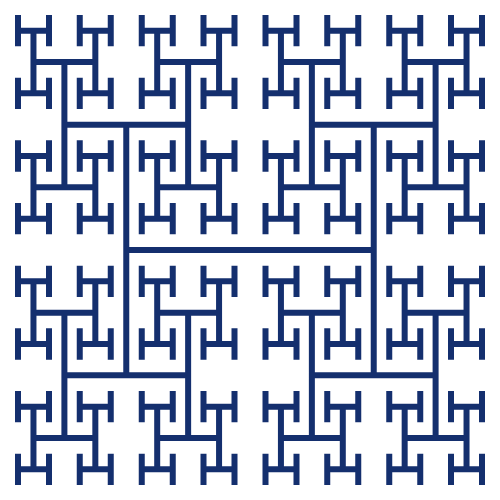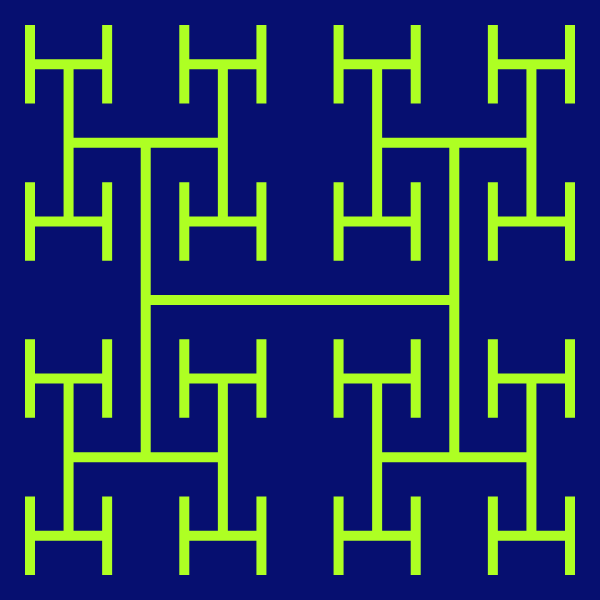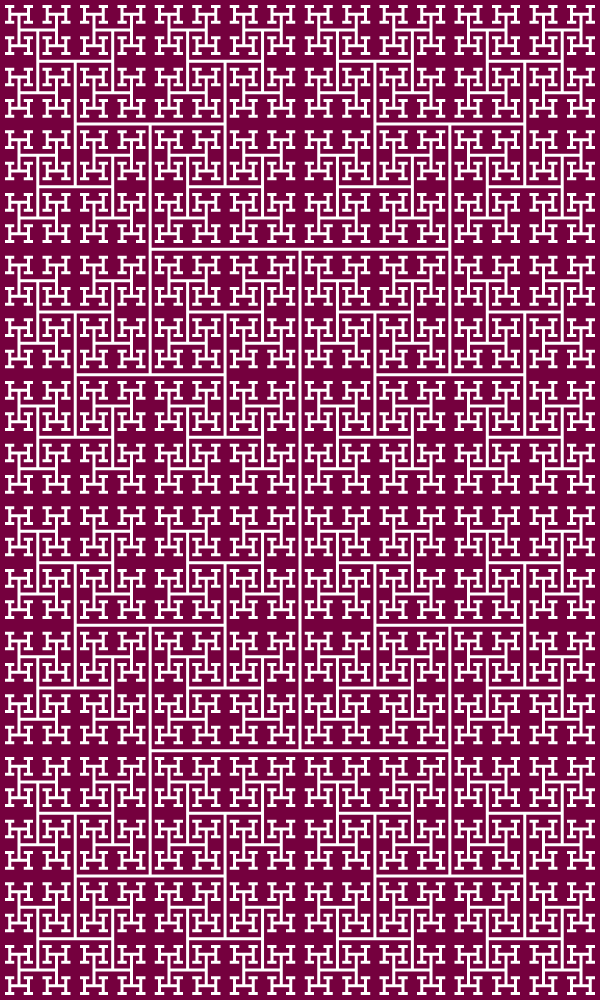This utility lets you draw colorful and unique Hausdorff fractals. You can control the drawing process through a number of easy to adjust parameters. You can set the order of the H-fractal, which changes the number of letters H, adjust the dimensions of the space, and set the drawing orientation for the initial H character (either vertical or horizontal). You can also select any color for the H letter and background. Fun fact – the H-fractal is a fractal canopy that fills the entire space with an exception of a couple of points that it can never reach. Created by fractal fans from team Browserling. Fractabulous!
This utility lets you draw colorful and unique Hausdorff fractals. You can control the drawing process through a number of easy to adjust parameters. You can set the order of the H-fractal, which changes the number of letters H, adjust the dimensions of the space, and set the drawing orientation for the initial H character (either vertical or horizontal). You can also select any color for the H letter and background. Fun fact – the H-fractal is a fractal canopy that fills the entire space with an exception of a couple of points that it can never reach. Created by fractal fans from team Browserling. Fractabulous!

This online browser-based tool allows you to create a personalized Hausdorff fractal tree. This fractal is also known as an H-curve as it's entirely made out of many connected copies of the initial letter of Felix Hausdorff's surname. Modern literature often calls this fractal simply an H-tree and even a T-branching fractal, as the letter H can be created from two rotated T letters branching to the left and right. At the first iteration stage, the fractal is just a single letter H (or two T letters). At the second iteration step, four more H letters (each smaller by a factor of √2) are added to every vertex of the original H letter. At the third step, another sixteen smaller H letters are added, and so on. It is easy to see that the number of letters H (denoted by Hn) at the n-th iteration stage is calculated by the formula Hn = ∑4m (where m ranges from 0 to n-1). For example, at the 3rd iteration stage there are Hn = 4⁰ + 4¹ + 4² = 1 + 4 + 16 = 21 letters H. The number of letters H can also be determined by the recursive formula Hn = 4×Hn-1 + 1. For example, on the 4th iteration stage there are H4 = 4×H3 + 1 = 21 * 4 + 1 = 85 letters H. As the fractal's depth increases, the points of the H-curve come arbitrarily close to every point in the space. Mind boggling and awesome at the same time, or as we love to say – fractabulous!
This online browser-based tool allows you to create a personalized Hausdorff fractal tree. This fractal is also known as an H-curve as it's entirely made out of many connected copies of the initial letter of Felix Hausdorff's surname. Modern literature often calls this fractal simply an H-tree and even a T-branching fractal, as the letter H can be created from two rotated T letters branching to the left and right. At the first iteration stage, the fractal is just a single letter H (or two T letters). At the second iteration step, four more H letters (each smaller by a factor of √2) are added to every vertex of the original H letter. At the third step, another sixteen smaller H letters are added, and so on. It is easy to see that the number of letters H (denoted by Hn) at the n-th iteration stage is calculated by the formula Hn = ∑4m (where m ranges from 0 to n-1). For example, at the 3rd iteration stage there are Hn = 4⁰ + 4¹ + 4² = 1 + 4 + 16 = 21 letters H. The number of letters H can also be determined by the recursive formula Hn = 4×Hn-1 + 1. For example, on the 4th iteration stage there are H4 = 4×H3 + 1 = 21 * 4 + 1 = 85 letters H. As the fractal's depth increases, the points of the H-curve come arbitrarily close to every point in the space. Mind boggling and awesome at the same time, or as we love to say – fractabulous!
This example illustrates the H-fractal at the fourth iteration stage. As discussed above, there are 4⁰ + 4¹ + 4² + 4³ = 85 H characters. We've adjusted the options so that the H chars are drawn horizontally in a 500x500 space with lagoon-blue line color.
In this example, we set the recursion depth to only 3 iteration steps, which means that there are 21 letters H (or 42 letters T, if you're creating it from Ts). We use a green-yellow color for the line and deep-sapphire color for the background. We also use 600x600px square canvas with padding of 25px and a line segment width of 10px.
In this example, we generate 6 iterations of a vertical Hausdorff tree. We've set the size to 600 by 1000 pixels and chosen the H orientation to be vertical. Let's try to calculate the total number of H letters in this fractal. H₆ = 4⁰ + 4¹ + 4² + 4³ + 4⁴ + 4⁵ = 1 + 4 + 16 + 64 + 256 + 1024 = 1365. Good luck shifting to the 6th gear!
You can pass options to this tool using their codes as query arguments and it will automatically compute output. To get the code of an option, just hover over its icon. Here's how to type it in your browser's address bar. Click to try!
Walk the Hilbert fractal and enumerate its coordinates.
Walk the Peano fractal and enumerate its coordinates.
Walk the Moore fractal and enumerate its coordinates.
Encode the Hilbert fractal as a string.
Encode the Peano fractal as a string.
Encode the Moore fractal as a string.
Encode the Cantor set as a string.
Encode the Heighway Dragon as a string.
Encode the Sierpinski fractal as a string.
Generate a Sierpinski tetrahedron (tetrix) fractal.
Generate a Cantor's cube fractal.
Generate a Sierpinski-Menger fractal.
Generate a Jerusalem cube fractal.
Generate a Jeaninne Mosely fractal.
Generate a Mandelbrot tree fractal.
Generate a Barnsley's tree fractal.
Generate a Barnsley's fern fractal.
Generate a binary tree fractal.
Generate a ternary tree fractal.
Generate a dragon tree fractal.
Generate a de Rham curve.
Generate a Takagi-Landsberg fractal curve.
Generate a Peano pentagon fractal curve.
Generate a tridendrite fractal curve.
Generate a Pentigree fractal curve.
Generate a lucky seven fractal curve.
Generate an Eisenstein fractions fractal curve.
Generate a Bagula double five fractal curve.
Generate a Julia fractal set.
Generate a Mandelbrot fractal set.
Generate a Mandelbulb fractal.
Generate a Mandelbox fractal.
Generate a Buddhabrot fractal.
Generate a Burning Ship fractal.
Generate a toothpick sequence fractal.
Generate an Ulam-Warburton fractal curve.
Generate an ASCII fractal.
Generate an ANSI fractal.
Generate a Unicode fractal.
Generate an emoji fractal.
Generate a braille code fractal.
Generate a fractal in audio form.
Create a fractal that looks like one but isn't a fractal.
Generate a fractal from any text.
Generate a fractal from a string.
Generate a fractal from a number.
Join any two fractals together.
Create a completely random fractal.
Set up an arbitrary IFS system and iterate it.
Recursively transform an image using IFS rules.
Run infinite compositions of analytic functions.
Create a surface that mimics a natural terrain.
Create a fractal surface via Brownian motion.
Apply fractal algorithms on your image and make it self-similar.
Find fractal patterns in any given image.
Find fractal patterns in any given text.
Find fractal patterns in any given number.
Tessellate a plane with fractals.
Run a cellular automaton with custom rules.
Play Conway's Game of Life on an infinite grid.
Subscribe to our updates. We'll let you know when we release new tools, features, and organize online workshops.
Enter your email here
We're Browserling — a friendly and fun cross-browser testing company powered by alien technology. At Browserling our mission is to make people's lives easier, so we created this collection of fractal tools. Our tools have the simplest user interface that doesn't require advanced computer skills and they are used by millions of people every month. Our fractal tools are actually powered by our web developer tools that we created over the last couple of years. Check them out!




